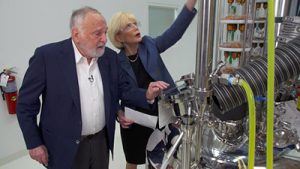
The Electrochemical Society with Toyota North America
2017-2018 ECS Toyota Young Investigator Fellowship
for Projects in Green Energy Technology
Proposal Submission Deadline: January 31, 2017
ECS, in partnership with the Toyota Research Institute of North America (TRINA), a division of Toyota Motor Engineering & Manufacturing North America, Inc. (TEMA), is requesting proposals from young professors and scholars pursuing innovative electrochemical research in green energy technology.
Global development of industry and technology in the 20th century, increased production of vehicles and the growing population have resulted in massive consumption of fossil fuels. Today, the automotive industry faces three challenges regarding environmental and energy issues: (1) finding a viable alternative energy source as a replacement for oil, (2) reducing CO2 emissions and (3) preventing air pollution. Although the demand for oil alternatives—such as natural gas, electricity and hydrogen—may grow, each alternative energy source has its disadvantages. Currently, oil remains the main source of automotive fuel; however, further research and development of alternative energies may bring change.
Fellowship Objectives and Content
The purpose of the ECS Toyota Young Investigator Fellowship is to encourage young professors and scholars to pursue research in green energy technology that may promote the development of next-generation vehicles capable of utilizing alternative fuels. Electrochemical research has already informed the development and improvement of innovative batteries, electrocatalysts, photovoltaics and fuel cells.
Through this fellowship, ECS and TRINA hope to see more innovative and unconventional technologies borne from electrochemical research.
The fellowship will be awarded to a minimum of one candidate annually. Winners will receive a restricted grant of no less than $50,000 to conduct the research outlined in their proposal within one year. Winners will also receive a one-year complimentary ECS membership as well as the opportunity to present and/or publish their research with ECS.
Meet previous winners.
(more…)







 Researchers have traced the paths of three water channels in an ancient photosynthetic organism—a strain of cyanobacteria—to provide the first comprehensive, experimental study of how that organism uses and regulates water to create energy.
Researchers have traced the paths of three water channels in an ancient photosynthetic organism—a strain of cyanobacteria—to provide the first comprehensive, experimental study of how that organism uses and regulates water to create energy. Starting in 2014, ECS partnered with Toyota Research Institute of North America to establish a fellowship for young researchers working in green energy technology, including efforts to find viable alternative energy sources as a replacement for oil, reduce carbon dioxide emissions, and prevent air pollution.
Starting in 2014, ECS partnered with Toyota Research Institute of North America to establish a fellowship for young researchers working in green energy technology, including efforts to find viable alternative energy sources as a replacement for oil, reduce carbon dioxide emissions, and prevent air pollution.